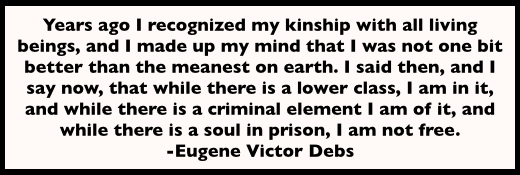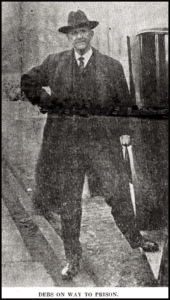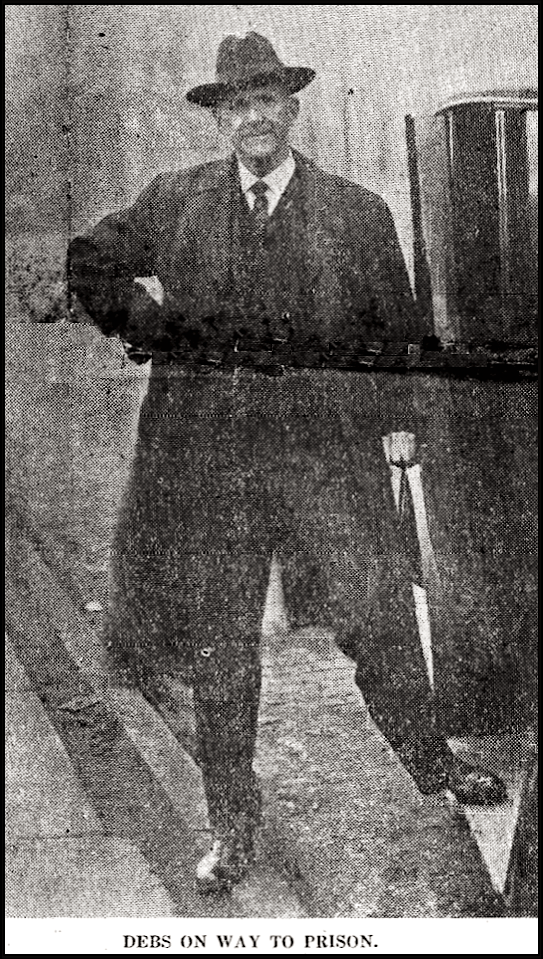 ———-
———-
Hellraisers Journal – Thursday April 17, 1919
Moundsville, West Virginia – With Eugene Debs at West Virginia State Prison
From The Ohio Socialist of April 16, 1919:
Debs’ First Day In Prison
By DAVID KARSHNER [KARSNER].
Moundsville, W. Va., April 14.-Eugene Victor Debs will sleep tonight, not in a cage like a wild beast, as he slept last night, his first night in the West Virginia State Prison, but in a little room in the hospital of the prison, for “Our Gene” has been appointed a hospital attendant, and he has a separate room to himself, with a white iron bed, newly clothed, a table and a chair.
Shortly after 11 o’clock this morning Debs was taken from his cell, No. 51, in the second tier of the south wing, to the prison baths. He was examined by Dr. O. P. Wilson, the prison physician, and then donned prison underclothing and the prison uniform. But when I saw Debs late this afternoon the prison suit was not unbecoming to him. It was well fitting and contained the tiniest check. It is the kind of a suit that anybody might purchase at a cheap clothing store.
Warden Joseph Z. Terrill explained that he had at first thought of placing Debs in the prison library because of his knowledge of books and literature, but he did not do this because he thought that he might be too much subjected to curiosity. As hospital attendant Debs will have a rom entirely to himself. The room is of a good size, larger than most rooms of the Bronx apartments. It is on the ground floor. There are two ample windows one facing the south, and one the east. There are no bars at his windows. The door will be open at all times, and Debs has full privilege to come and go as he pleases. He has full and complete access to the prison yard and the lawns.
When Engdahl, Wagenknecht and myself went to the prison today we were led by Warden Terrill through the turntable. He took us through long winding corridors to the hospital section. As we passed the prison druggist was making little pellets. He was a convict “in” for murder. He looked at us as we passed with a furtive look, then went on filling the capsules.
We walked up one flight of stairs. The warden opened the door of a freshly painted room, and there was “Our Gene” quietly sitting in a low rocking chair, smoking his pipe and reading a book. At first he did not look up.
“Mr. Debs, here are your friends back again to see you,” said the warden. Gene put his book aside on the bed and disturbed the big gray cat that was sleeping by his side.
Greetings were over and the warden then told Debs that he had free access to the prison library. “We have a rule here, Mr. Debs, that prisoners must be checked up on the books they take from the library, but we will waive that rule for you. I know you appreciate the value of good books.
“Indeed I do,” said Debs, thanking the warden.
We talked a few minutes and Debs told us that he slept “like a log last night,” and, now felt “as chipper, as a young goat on a tin roof.”
He laughed good naturally as he looked at his prison garb and asked us how we liked his new suit. Debs had come to the penitentiary in a new blue serge. He was still wearing the vest of it. He wore his own collar and tie.
“I have met many fine men in here,” said Gene to us. “In the cell right next to mine last night there was a man whom I met at McKees Rocks, Pa., many years ago. He was telling me his story.” We walked down the hall with Debs, and Gene assured us that he had had three good meals, and “that everything was all right,” his usual expression in cases of extreme adversity. The warden made it plain to us that he did not wish our visit to be of length. We tarried a moment while Debs said that he had received a number of telegrams from his comrades in all parts of the country.
Just before we entered the prison we met three messenger boys, and all of them owned up they had just delivered messages for Debs. The warden insisted that Engdahl, Wagenknecht and myself take dinner with him. We did so. The warden was interested to learn something of Debs’ history.
Warden Terrill told us that twenty-five years ago he was a telegraph operator on the Baltimore & Ohio Railroad when Debs was organizing the railroad men in the American Railway Union. “I remember when Debs went to prison at that time,” he said. The warden admitted that he had never seen Debs, but added, “he has a wonderful mind, and a fine brain.”
As we talked with the keeper of the great liberator in his private apartments on the top floor of the prison overlooking the Ohio valley and the river that flows at its feet Terrill’s little girl romped and played on the floor. The name of Debs was mentioned frequently and finally the little brown-eyed baby looked up in her father’s eyes and asked: “Daddy, who is Deb?” The prison warden blushed. “Ask these gentlemen here, my dear, they seem to know better than I.” In turn the three visiting men explained to the little girl who Gene Debs is and told her that some day she could say she had lived in the same house with him.
“I don’t know what you gentlemen may think,” said the warden, at one point, “but I want you all to know that I have had no instructions from any one, none from the governor, nor from Washington, to show Mr. Debs any special favors or consideration. What I am doing is purely my own affairs.”
The warden seemed to want to impress us with that view of the matter. We had all hazarded the guess that in the case of Debs unusual consideration would be policy, and that this consideration very likely came from high authority. The warden denies it.
While we were all talking in Debs’ room the warden spoke about Gene’s new job as hospital attendant.
“I am going to do whatever you think is best,” said Debs. “I want to earn my board here at any rate,” he added, and the tall, classic frame of the great Socialist and humanist bent almost double with silvery laughter.
The book that Debs had been reading was John Reed’s “Ten Days That Shook the World.” I had presented Debs with my own copy of that book.
Before we left, the warden permitted us to leave with Debs a box of cigars, a cake of chocolate, and a bag of apples and oranges. In the corridor we passed several convicts painting the banisters. Debs patted each on the bak. It was spontaneous movement of his. He could not refrain. The warden smiled.
In spite of this kindness, in spite of this manifestation of official consideration for Our Gene, let our Socialists not relax one iota in their efforts to get Debs out of prison and all of the men and women out of prison who were convicted under the most atrocious law that ever disgraced this republic. The main point to keep in mind is that Debs is denied his liberty. He is a prisoner behind bars. He cannot come out of jail for ten years unless the organized power of the working class forces the capitalist class to swing the lever of that automatic turntable thorough which Debs passed Sunday night.
Debs knows this as much as any. It is liberty that Debs wants, and in getting liberty for himself he demands it for every breathing being. I am reminded of Debs’ classic statement, printed and stated so many hundreds of times. Shall we write it again:
While there is a lower class I am in it.
While there is criminal class I am of it.
While there is a soul in prison I am not free.———-
[Emphasis added.]
“Debs On Way to Prison”
———-
~~~~~~~~~~~~~~~~~~~~~~
SOURCES & IMAGES
Quote EVD, Debs Address to the Court, Sept 14, 1918
http://www.emersonkent.com/speeches/address_to_the_court.htm
https://play.google.com/books/reader?id=D2wfAQAAMAAJ&printsec=frontcover&pg=GBS.RA6-PA4
http://debs.indstate.edu/d288d37_1918.pdf
The Ohio Socialist
(Cleveland, Ohio)
-Apr 16, 1919
https://www.marxists.org/history/usa/pubs/ohio-socialist/064-apr-16-1919.pdf
See also:
Debs Goes to Prison
-by David Karsner
NY, 1919
Note: introduction dated: May 1, 1919
https://books.google.com/books?id=j0hYAAAAMAAJ
https://catalog.hathitrust.org/Record/000770237
https://archive.org/details/debsgoestopriso00karsgoog/page/n3
Debs
His Authorized Life and Letters
(-from Woodstock Prison to Atlanta)
Note: authorized by Debs at Atlanta Prison
on July 17, 1919, see page vii.)
-by David Karsner
Boni and Liveright, 1919
https://books.google.com/books?id=U9cPAQAAMAAJ
Re ARU Strike, see “Chapter VII, Labor Unionist and Woodstock”
https://play.google.com/books/reader?id=U9cPAQAAMAAJ&printsec=frontcover&pg=GBS.PA130
Note: above photo can also be found here:
IN State U, Cunningham Memorial Library
Debs Photograph Collection
https://library.indstate.edu/rbsc/debs/photos_a.html
Photograph of Eugene V. Debs at depot en route to prison 13 April 1919. Photo by or intended for New York Call. Cleveland, Ohio.
David Karsner
https://en.wikipedia.org/wiki/David_Karsner
J. Louis Engdahl
https://en.wikipedia.org/wiki/J._Louis_Engdahl
Alfred Wagenknecht
https://en.wikipedia.org/wiki/Alfred_Wagenknecht
~~~~~~~~~~~~~~~~~~~~~~~~~~~~~~~~~~~~~~~~~~~~~
From Debs Speech to Court, Sept 1918:
We Have Fed You All For A Thousand Years – Bruce Brackney


